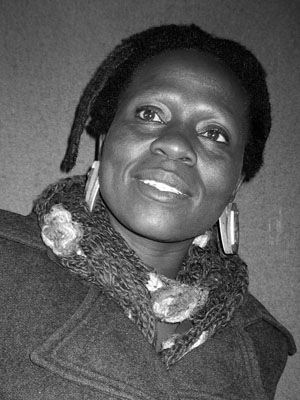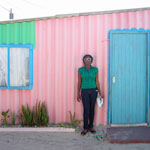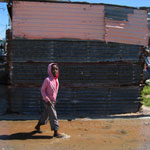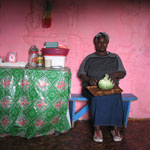LINDEKA QAMPI
 Lindeka Qampi is a mother of four children living in Khayelitsha in Cape Town. she began taking photographs four years ago, in 2006, when she met members of the Iliso Labantu
Lindeka Qampi is a mother of four children living in Khayelitsha in Cape Town. she began taking photographs four years ago, in 2006, when she met members of the Iliso Labantu
photo Group.
She joined the group and has begun to document different communities near her home and in the Eastern Cape, where her family comes from, which tell the stories of peoples everyday lives.
Lindeka is now supporting her family through her photography and she is very happy to have found this creative outlet and means of financial support.
Her pictures have been in many exhibitions now in Cape Town her work has begun to be seen internationally too.
She has contributed to the following events: Transitions Group photography Exhibition, alison Kelly Gallery, melbourne, australia. august 2009. soccer Kulture. UCT Gallery, Cape Town, South Africa. 2010, Africa music festival – 2010 Exhibition. Wurzberg, Germany. 2010, Tollwood festival, munich, Germany. 2010, Landshut Cultural festival, Landshut, Germany. 2010 and onani Africa photo festival, Cape Town. 2010
Works
Selected Exhibitions & Projects
SELECTED EXHIBITIONS
| Transitions Group photography Exhibition, alison Kelly Gallery, Melbourne, Australia. | 2009 | |
| Soccer Kulture. UCT Gallery, Cape Town, South Africa | 2010 | |
| Africa music festival – 2010 Exhibition. Wurzberg, Germany | 2010 | |
| Tollwood festival, munich, Germany. | 2010 | |
| Landshut Cultural festival, Landshut, Germany. | 2010 | |
| Bonani Africa photo festival, Cape Town. | 2010 |
Iliso Labantu is an informal cooperative of township based photographers who have been working together since 2005. The organisation aims to educate young photographers and to promote photography as a viable career option for previously disadvantaged individuals. Through a program of regular weekend workshops, the group has extensively documented daily life in many of the predominantly Xhosa communities in the Cape Town area. The resulting images have been exhibited in those same communities and to a wider national and international audience.
One of the greatest strengths of the approach that the Iliso Labantu photographers have taken is to record some of the realities of daily life in the townships and to show those photographs to many people who are either unable or unwilling to witness life there for themselves.
The Iliso Labantu photo Group is looking to publish a collection of their work in the near future.
www.ilisolabantu.org










